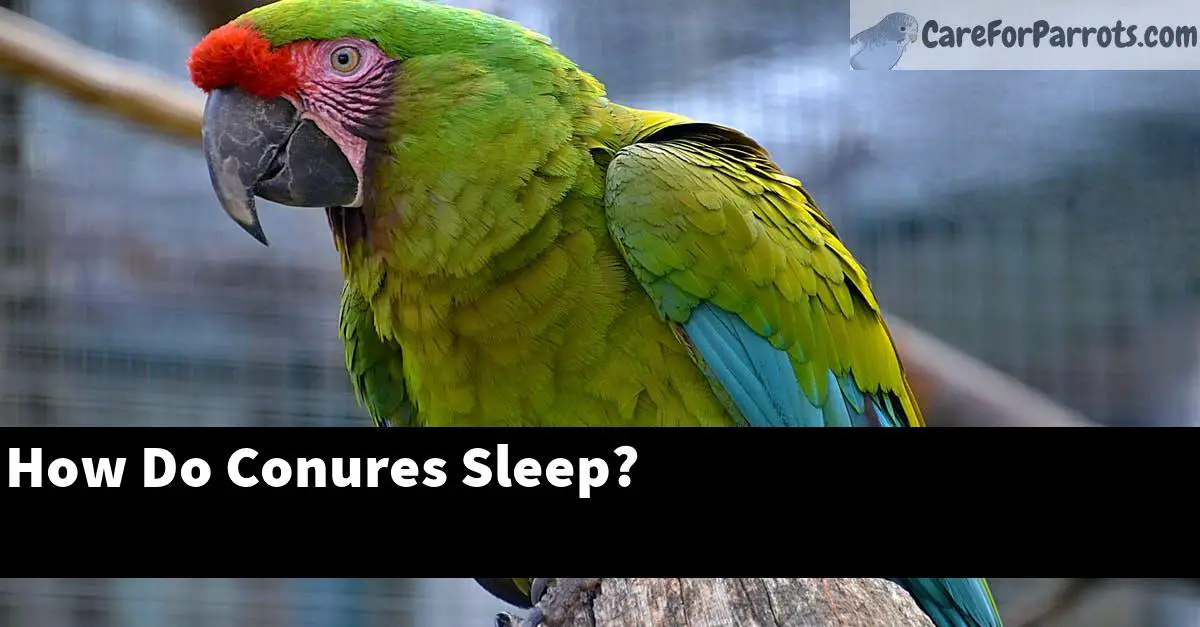You’re probably curious about how your feathery friend catches some shut-eye after a long day of singing, playing, and exploring. Conures, like other parrots, have their own unique sleep patterns and habits that help them rest and recharge. In this article, we’ll dive into everything you need to know about how conures sleep, including their sleep schedule, preferred sleeping positions, and even ways to help them sleep better.
If you’ve ever wondered whether your conure sleeps similarly to you, you’ll be interested to learn that their sleep cycles are quite different. We’ll share some fascinating insights about these vibrant creatures’ sleep habits, which will help you provide the best care for your pet.
We’ve got a wealth of information lined up for you, so let’s dive into the world of conure sleep and discover how to keep your little companion well-rested and happy.
Table of Contents
How Much Sleep Do Conures Need?
Understanding the sleep requirements
Conures, just like other birds, have specific sleep requirements that are essential for their well-being. On average, conures need to sleep for about 10 to 12 hours per night. This allows them to maintain their energy levels and stay healthy. While this might seem like a lot of sleep, remember that birds have a higher metabolic rate than humans, which means they burn energy more quickly and require more restorative rest.
Importance of a consistent sleep schedule
It’s crucial to establish a consistent sleep schedule for your conure. Birds are creatures of habit, and they benefit from having a predictable daily routine. Try to put your conure to bed at the same time every night and wake them up at the same time each morning. This will help regulate their internal clock, making it easier for them to fall asleep and wake up on schedule.
Conure Sleeping Positions
The one-legged stance
One common sleeping position for conures is the one-legged stance. In this position, the bird will tuck one foot up into their feathers and balance on the other. This might look uncomfortable to us, but it’s perfectly normal for conures and other birds. It’s thought that this position helps conserve body heat and minimize muscle fatigue.
The head-under-wing pose
Another popular sleeping position for conures is the head-under-wing pose. In this position, the bird will tuck their head under one wing while resting on a perch. This serves as a sort of natural blanket, keeping the bird warm and comfortable while they sleep.
Creating a Comfortable Sleep Environment for Your Conure
Choosing the right cage location
To ensure that your conure gets a good night’s sleep, you’ll want to create a comfortable and peaceful sleep environment. Start by selecting the right location for their cage. Choose a quiet, low-traffic area of your home where your conure can sleep undisturbed. It’s also a good idea to keep their cage away from direct sunlight and drafts, as temperature fluctuations can disrupt their sleep.
Using a cage cover
Using a cage cover can be an effective way to provide your conure with a sense of security and darkness while they sleep. Make sure to choose a breathable, non-toxic fabric that allows for proper air circulation. Introduce the cover gradually, so your conure can get used to it and associate it with bedtime.
Matiniy 2 Pcs Pirate Parrot on Shoulder Life Sized Artificial Parrot Toy for Costume Dress-up Accessory for Halloween Party(Multicolor)
$14.99 (as of 24/02/2026 22:51 GMT +03:00 - More infoProduct prices and availability are accurate as of the date/time indicated and are subject to change. Any price and availability information displayed on [relevant Amazon Site(s), as applicable] at the time of purchase will apply to the purchase of this product.)Bird Toys, Parrot Toys for Large Birds,Natural Corn cob and Loofah Slices Bird chew Toys for African Grey Parrots, Macaws, Cockatoos, Amazon Parrot and other Small and Medium-Sized Parrot (Colorful)
$12.97 ($12.97 / count) (as of 25/02/2026 00:17 GMT +03:00 - More infoProduct prices and availability are accurate as of the date/time indicated and are subject to change. Any price and availability information displayed on [relevant Amazon Site(s), as applicable] at the time of purchase will apply to the purchase of this product.)Kaytee Fiesta Parrot Food, Nutritious and Fun Blend, Supports Skin, Feather, Digestion, Brain and Heart Health, 4.5 pounds
16% OffProviding the right perch
Conures sleep best on a perch that’s comfortable and secure. Make sure to provide a variety of perches with different textures and widths to promote good foot health. Position the sleeping perch higher up in the cage, as birds instinctively feel safer when they are at an elevated height.
Conclusion
Understanding how conures sleep and providing a comfortable environment for rest are crucial aspects of keeping your feathery companion healthy and happy. By establishing a consistent sleep schedule, offering a variety of comfortable perches, and creating a peaceful sleep environment, you can ensure your conure gets the rest they need. A well-rested conure is more likely to be active, social, and content, making for a stronger bond between you and your pet.
FAQ
1. Do conures experience REM sleep like humans?
Yes, conures, like other birds, experience REM (rapid eye movement) sleep, during which they experience dreaming. However, their REM sleep is shorter in duration than that of humans, and their sleep cycles are different.
2. Can I leave a nightlight on for my conure?
It’s generally best to provide a completely dark environment for your conure to sleep in, as this mimics their natural habitat. However, if your conure shows signs of anxiety or fear in complete darkness, a dim nightlight can be used to help them feel more secure.
3. How can I tell if my conure is getting enough sleep?
A well-rested conure will be active, alert, and social during their waking hours. Signs of sleep deprivation in conures can include irritability, excessive napping during the day, and a decrease in activity levels.
4. Should I remove toys and food from my conure’s cage at night?
It’s not necessary to remove toys and food from your conure’s cage at night. However, you may want to ensure that any noisy toys are not within reach, as they might disturb your conure’s sleep.
5. Can I play soothing music or white noise for my conure at bedtime?
Some conures may benefit from gentle background noise to help them relax and fall asleep. However, it’s essential to monitor your bird’s response and adjust the volume or type of sound accordingly to ensure it doesn’t cause stress or disturbance.
























